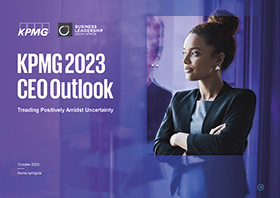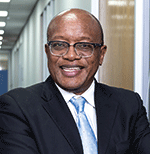

While CEOs remain confident in the future of the global economy, there is a significant consideration for escalating uncertainty and rising global crises. This has forced a reset in strategic thinking, a consolidation of talent, a renewed focus on collaborative approaches, and an eye on upcoming technology. This is according to the KPMG 2023 CEO Outlook Survey – Southern Africa.
This annual South Africa report, which KPMG compiled in partnership with Business Leadership South Africa (BLSA), draws on the perspectives of 60 CEOs from South Africa and six other countries within the southern Africa region. This follows on the back of the Global KPMG CEO Outlook Survey conducted among 1325 CEOs across 11 markets, which examined how CEOs are looking to tackle this complex set of emerging and converging challenges.
According to Ignatius Sehoole, CEO of KPMG in southern Africa, the region retains significant long-term potential, with a growing human capital advantage, access to abundant mineral and natural resources, and pockets of excellence in institutions and infrastructure. Emerging market economies are, however, also severely impacted by world events. As global capital remains risk-averse, smaller currencies and stock markets suffer, and the potential for foreign investment diminishes. Organic growth is being prioritised over dealmaking, as CEOs focus on keeping the number of uncontrolled variables to a minimum.
BLSA CEO, Busisiwe Mavuso noted that in South Africa, business confidence remains stubbornly pessimistic. Our population now sits at 62 million, with 19 million citizens dependent on government grants at an annual cost of R200 billion to the fiscus. The provision of essential services remains a challenge. Poverty and unemployment remain rife, increasing the fragility of the system and its susceptibility to the effects of global crises. Diversity remains a priority, but many companies are struggling to make meaningful progress at the highest levels.
According to the survey, an approach that CEOs are adopting to tackle the confluence of global emergencies is to concentrate on micro decision making and the factors under their control, and to prioritise internal and external collaboration to improve resilience.
KPMG’s research also shows that CEOs in southern Africa, like their counterparts around the world, are largely taking a consolidating, anticipatory approach, waiting to see whether our compounding crises will continue to escalate, or whether we might begin to see an easing of global tensions and a return to stability. Business leaders, alongside their civil society and governmental counterparts, will have to continue to navigate difficult waters, and be on the lookout for opportunities not only to find pockets of growth, but to help address the challenges we collectively face,” says Mavuso.

Business outlook
While global CEO confidence in the growth prospects of their own companies over the next three years hit a three-year low at 77%, down from 85% in 2020, southern African CEOs are far more optimistic, with 90% of respondents indicating confidence in their company’s growth prospects.
In addition, 96% of South African CEOs see their earnings increasing over the next three years. “What we are seeing coming out of this report is that CEOs are placing an increased emphasis on organic growth opportunities in lieu of deal-making opportunities, as global uncertainty continues. The top three operational priorities for southern African CEOs to achieve their growth objectives over the next three years include advancing digitisation and connectivity of all functional areas (35%), the improvement of customer experience (28%), and improving their employee value proposition to attract and retain the necessary talent (28%),” says Frank Blackmore, lead economist at KPMG in South Africa.
Disruptive emerging technologies
Despite the economic challenges in southern Africa such as inflation, 71% of southern Africa’s CEOs are making GenAI a top investment priority for their organisations. Its prominence has positioned and geared it as among one of the top priorities to get right as a cutting-edge investment by CEOs. This finding is in line with the 2023 KPMG Global CEO Outlook report, with 70% of global CEOs noting their interest in the investment of such emerging technology.
With the willingness of businesses to adopt GenAI into the workplace, there are notable challenges and concerns that CEOs have also expressed. Accordingly, 33% of them believe that the main challenge they will face is securing the technical capability and skills required for their employees to benefit from GenAI in their everyday work.
Furthermore, the ethics of this emerging technology remain an ongoing discussion within the business, with 80% of southern Africa’s CEOs agreeing that a lack of current regulation for GenAI may become a barrier to the success of their organisation adoption. Considering how GenAI should be regulated, a common outlook of CEOs was to view this technology as a critical topic of conversation for business going forward.
Cybersecurity risk is an additional ongoing concern, which may impact trust in implementing GenAI efforts and adoption. In fact, 84% of southern Africa’s CEOs agree that GenAI could be viewed as a double-edged sword, providing a high level of security and cyber-attack detection, and potentially introducing an increased risk of new attack methods.
“Artificial Intelligence models have the potential to transform businesses and everyday life profoundly. Yet their applications, including the benefits and risks, are widely misunderstood. Cybersecurity is rated as the top risk globally that will impact public trust in the use of this technology. We need to embrace this technology in a safe and secure way,” says KPMG partner, Sipho Ndaba.
Talent
In the post-pandemic era, remote work was the most viable option at the time. However, this is slowly changing, with 72% of southern African CEOs indicating that they support the working environment returning to in-person work within the next three years, while the remaining respondents believe in a hybrid or remote way of working. This finding is in line with global CEOs, with the majority (64%), anticipating that there will be a full return.
What is interesting to note is that, given technology advances through the rise of generative AI, 73% of CEOs in southern Africa have expressed that they will be prioritising the placement of their capital investment into acquiring new technology rather than the upskilling of their workforce.
“However, 96 % of South African CEOs have still projected a growing headcount over the next three years. The findings in the report also pointed to the talent landscape evolving and that there is a definitive shift in leadership and management style. The majority of CEOs across southern Africa (53%) agree that it will be through shared management and operational responsibilities that greater success will be enabled during this politically, socially and economically unpredictable time,” says Makgotso Letsitsi, head of People, Transformation and Citizenship at KPMG in South Africa.
Corporate investment and delivering impact
At a global level, there is increased recognition amongst CEOs of the key role that Environmental, Social and Governance (ESG) plays in corporate strategy. Impact on brand, customers and employees remains the focus of ESG strategy, with a shared understanding that shareholder return is not where the greatest impact will be felt. In fact, 58% of southern Africa’s CEOs say it will take three to five years to see a significant return on investment. Some southern African countries believe that it could take between five and seven years. This finding agrees with that of global CEOs, as they believe that it will still be a few years before they see a return on their ESG investments.
According to KPMG partner, Pieter Scholtz, CEOs across southern Africa agree that key investment priorities include governance models and transparency protocols, and also addressing environmental challenges and focusing on diversity, equity and inclusion. “The ESG space has grown in southern Africa and CEOs believe that the public is looking for businesses to fill the void in various societal issues, including diversity and inclusion within the workplace. Diversity and inclusion remain a top priority in organisations, with 83% of southern Africa’s CEOs believing that achieving gender equality in the C-suite will be a critical determining factor.
“While we know that CEOs, globally and in southern Africa, agree that there is a connection between a strong ESG strategy and positive financial performance, given frequently-changing ESG regulations CEOs are also rethinking and resetting their ESG strategies as their understanding of the landscape continues to grow.”
Furthermore, barriers remain to achieve a net zero climate goal for global corporations, including lack of appropriate technological skills, cost of decarbonisation, lack of skills to implement solutions, the complexity of decarbonising supply chains, and lack of internal governance and controls to operationalise it. For southern Africa’s CEOs, however, 47% believe that lack of appropriate technology solutions will be the greatest barrier to achieving net zero or similar climate ambitions, and 32% say that a higher cost of and/or difficulty in raising finance may be the main reason why the expectations of stakeholders will not be met when it comes to ESG.
“As we examine the KPMG CEO Outlook Report, we can see how CEO views on what risk factors they are facing in their businesses have shifted. The rise of generative AI, how talent management is viewed, and high expectations in addressing ESG have become topical business focus areas. CEOs are not only trying to understand how to operate in tomorrow’s market, but also how they can capitalise on new technologies, while nurturing their workforce through shared management and operational responsibilities, and ensuring their ESG initiatives gain traction,” concludes Sehoole.

© Technews Publishing (Pty) Ltd | All Rights Reserved